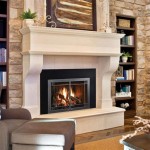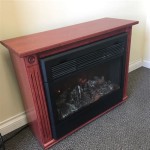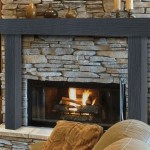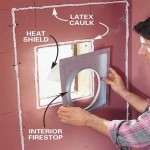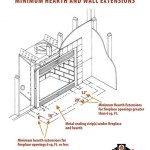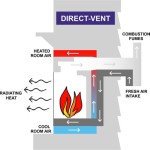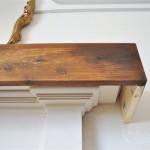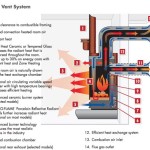Understanding Wood Fireplace Insert Fans: Efficiency and Performance
Wood fireplace inserts offer a more efficient heating solution compared to traditional open fireplaces. However, even with an insert, a significant amount of heat can still be lost up the chimney. A wood fireplace insert fan, also known as a blower, is designed to address this issue by improving heat circulation and maximizing the efficiency of the heating appliance. This article will explore the function, benefits, types, and considerations for selecting a wood fireplace insert fan.
How Wood Fireplace Insert Fans Enhance Heating Efficiency
A fundamental aspect of wood fireplace insert fans is their mechanism of operation. These fans are typically installed near the firebox of the insert. As the firebox heats up, the fan activates, drawing cool air from the room. This air is then passed over the heated surfaces of the firebox, absorbing heat in the process. The heated air is subsequently expelled back into the room, creating a convection current that distributes warmth more effectively than radiant heat alone. Without a fan, the heat primarily rises and tends to accumulate near the ceiling, leaving the lower areas of the room cooler. The fan addresses this issue by forcing the heated air to circulate throughout the entire space, resulting in a more uniform and comfortable temperature.
Several factors contribute to the efficiency gains achieved by using an insert fan. Firstly, the fan increases the rate of heat transfer from the firebox to the room. By actively moving air over the hot surfaces, more heat is extracted and distributed. Secondly, the fan helps to prevent heat from escaping up the chimney. As the hot air is circulated within the room, less heat is lost through the venting system. Lastly, the fan enables the fireplace insert to heat a larger area more effectively. The improved circulation allows the warmth to reach distant corners of the room and even adjacent rooms, making the insert a more practical heating solution for larger spaces.
The amount of energy consumed by a wood fireplace insert fan is typically quite low compared to the heat output generated by the fireplace insert. Most fans are powered by standard household electricity and draw only a small amount of wattage. This makes them a relatively inexpensive way to significantly improve the heating efficiency of the fireplace insert. The cost savings in terms of reduced wood consumption and improved comfort often outweigh the cost of operating the fan.
Different Types of Wood Fireplace Insert Fans
Wood fireplace insert fans are not a one-size-fits-all solution. Different models are designed to accommodate various insert designs, heating requirements, and installation constraints. Understanding the different types available is essential for selecting the most appropriate fan for a specific fireplace insert.
Built-in fans are integrated into the design of the fireplace insert during manufacturing. These fans are specifically engineered to work with the insert's airflow patterns and heat output. They often feature variable speed controls, allowing the user to adjust the fan's output based on heating needs. Built-in fans typically offer the most seamless integration and optimized performance, but they are only available for inserts that are specifically designed to accommodate them.
Add-on fans are designed to be installed after the fireplace insert has been installed. These fans can be a viable option for older inserts or those not equipped with built-in fans. Add-on fans typically consist of a blower unit that is placed near the firebox and connected to a power source. They may be mounted below the insert, on the side, or even inside the firebox, depending on the design. The variety of add-on fans makes it crucial to choose a model that is compatible with the insert's dimensions and airflow characteristics.
There are also magnetic fans which are designed to sit on the top of the fireplace or insert. These fans are powered by the heat generated by the fire. A thermoelectric generator converts the heat into electricity, which then powers the fan. Magnetic fans are self-sufficient and do not require any external power source. They are also very quiet in operation because of their brushless design. However, their effectiveness is limited by the amount of heat available to power them.
When selecting a wood fireplace insert fan, it is essential to consider the insert's BTU (British Thermal Unit) rating, the size of the room to be heated, and the available space around the firebox. Choosing a fan that is appropriately sized for the insert and the room will ensure optimal performance and efficiency. Consulting with a qualified professional can help to determine the best fan type and model for a specific application.
Factors to Consider When Choosing a Wood Fireplace Insert Fan
Selecting the right wood fireplace insert fan involves considering not only the type of fan but also several other critical factors to ensure optimal performance, safety, and longevity. Paying attention to these details will help to avoid common pitfalls and maximize the benefits of the fan.
The CFM (Cubic Feet per Minute) rating indicates the amount of air that the fan can move. A higher CFM rating generally means that the fan can circulate more air and distribute heat more effectively. It's important to select a fan with a CFM rating that is appropriate for the size of the room being heated. A fan with too low a CFM rating will struggle to circulate the air effectively, while a fan with overly high CFM rating may create drafts and excessive noise.
Noise level is another important consideration. Some fans can be quite noisy, which can be disruptive and irritating, especially in quiet environments. Look for fans that are specifically designed for quiet operation. These fans often feature high-quality motors and blades that minimize noise. Reading customer reviews and comparing the noise levels of different models can help to make an informed decision.
Durability and quality should also be considered. The fan will be subject to high temperatures and frequent use, so it is essential to choose a model that is built to last. Look for fans with durable components and a robust construction. The warranty offered by the manufacturer can also be a good indicator of the fan's quality and reliability. A longer warranty typically suggests that the manufacturer has confidence in the product's durability.
Installation of the fan is another aspect that requires careful attention. Some fans are relatively easy to install, while others may require professional assistance. If installing an add-on fan, carefully follow the manufacturer's instructions. Ensuring that the fan is properly installed is crucial for its safe and efficient operation. Make sure to consider if the fan needs to be hardwired or can be plugged into a standard electrical outlet. Hardwiring requires electrical knowledge and safety precautions.
Maintenance is also important. Regular cleaning will help remove dust and debris that can accumulate on the fan blades and motor, reducing its efficiency and potentially causing overheating. Follow the manufacturer's recommendations for cleaning and maintenance. Some fans may require lubrication of the motor bearings to ensure smooth operation. Proper maintenance will extend the life of the fan and ensure that it continues to operate effectively.
Finally, safety certifications should be verified. Ensure that the fan is certified by a recognized safety organization, such as UL (Underwriters Laboratories) or ETL (Electrical Testing Laboratories). These certifications indicate that the fan has been tested and meets established safety standards. Using a certified fan will help to minimize the risk of electrical shock, fire, and other hazards.

Why Should I Get A Fireplace Blower For My Masonry

Wood Fireplace Inserts With Blowers Upgrade Your

Drolet Escape 1800 I Wood Fireplace Insert Trio W Ubuy

Why A Wood Burning Fireplace Insert Bethesda Md Service

What Are Fan Assisted Fireplaces Like How Do These Fans Work Panadero

How To Replace Your Rsf Fireplace Blower Fan

What Are Fan Assisted Fireplaces Like How Do These Fans Work Panadero

Fireplace Blower Fans What You Need For Heat Full Service Chimney

Celestial 900 Insert Fan Forced Urban Rural Horizon New Zealand

Wood Fireplace Inserts Burning Insert Napoleon Fireplaces
Related Posts

